-853X543.jpg)
THE BEST MALE ACTORS OF 2023: DEEPAK QAZIR
by Deepak Qazir Kejriwal December 31 2023, 12:00 am Estimated Reading Time: 6 mins, 3 secsAn actor having worked in the current year is insignificant when selecting the best among them, because cinematic appreciation transcends time, writes Deepak Qazir.
When evaluating the best actor, the focus for me is primarily on the artistic merit, performance - elements that persist beyond their immediate release. An actor's absence in recent releases doesn't diminish the importance of their past work. Their previous contributions remain influential and can grow one's appreciation of the art. Today I can see any film that I want to from across eras, thankfully because of the emergence of streaming platforms.
The criteria for selecting the best actors of the year should encompass a broader perspective that considers the enduring quality of the emotional resonance of their performances, the innovation in their approach, and the lasting impact they had on audiences - elements that are not confined to a specific time frame. In essence, the worth of an actor's past work or the absence of their recent performances shouldn't overshadow the value and impact of their work that have stood the test of time. Great acting remains relevant regardless of the year it belongs to.
So, here’s my list of the Best Actors of 2023. It doesn’t matter to me if they had films that were released this year or not!
KAMAL HAASAN
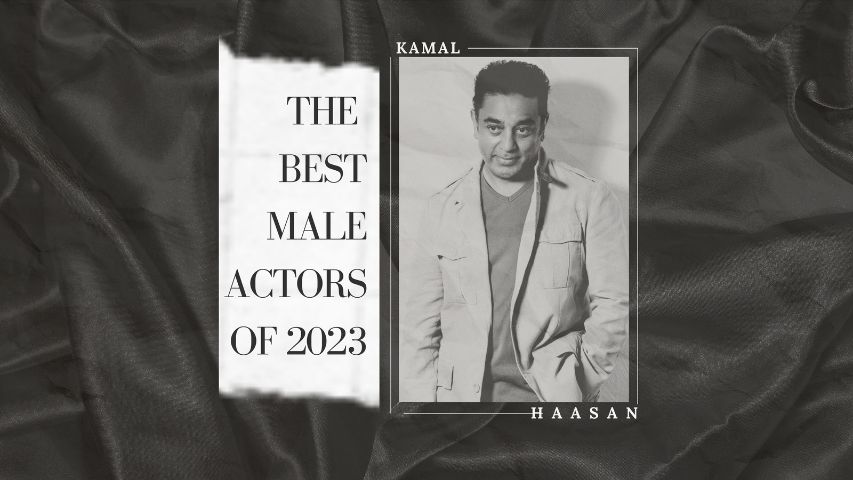
Kamal Haasan is one of the finest actors in Indian cinema. He has portrayed a wide range of characters across genres, displaying remarkable authenticity in each role. He's adept at comedy, drama, action, and has effortlessly transitioned between various roles. He immerses himself deeply into the characters he plays, often undergoing physical transformations and delving into the psychological aspects of each role.
Kamal Haasan is not just an actor but is also involved in various aspects of filmmaking, including screenwriting, directing, and producing. He has received numerous awards and honours throughout his career, including National Film Awards, Filmfare Awards, and Padma Bhushan, India's third-highest civilian award, in recognition of his contributions to Indian cinema.
NASEERUDDIN SHAH
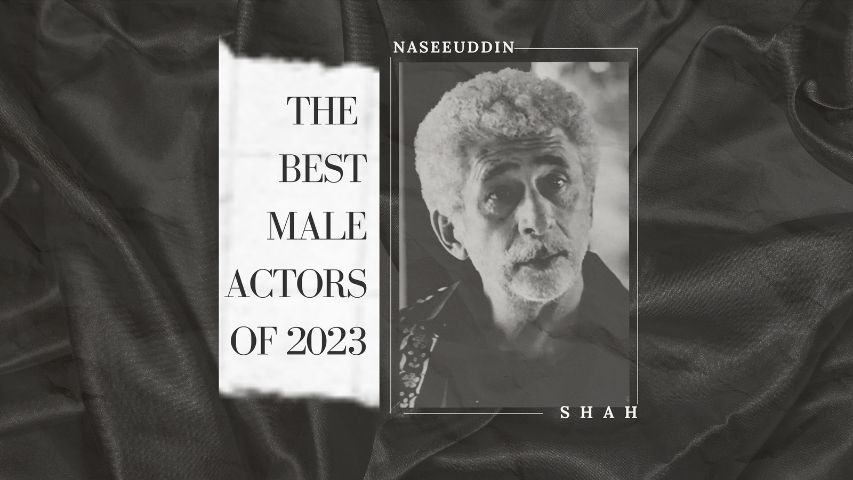
Naseeruddin Shah is revered by audiences and actors alike. His ability to convey a wide range of emotions with subtlety is remarkable. In films like Sparsh (1980), he portrayed the role of a visually impaired man with profound sensitivity, capturing the nuances of the character's emotions and struggles. In Jaane Bhi Do Yaaro (1983), a cult classic comedy his performance is unforgettable. His capability to delve into complex and layered roles is evident in movies like Masoom (1983). His portrayal of a conflicted man dealing with the consequences of his past extramarital affair resonated with audiences. He adapts to various genres, whether it's drama, comedy, or intense character-driven narratives. His role in A Wednesday (2008), as a nameless common man orchestrating a tense standoff, showcased his ability to command the screen.
Naseeruddin Shah’s roots in theatre reflect his craft. He has received multiple National Film Awards and Filmfare Awards. His contributions have left an indelible mark on Indian cinema, establishing him as a true legend and one of the best actors in the industry.
IRRFAN KHAN
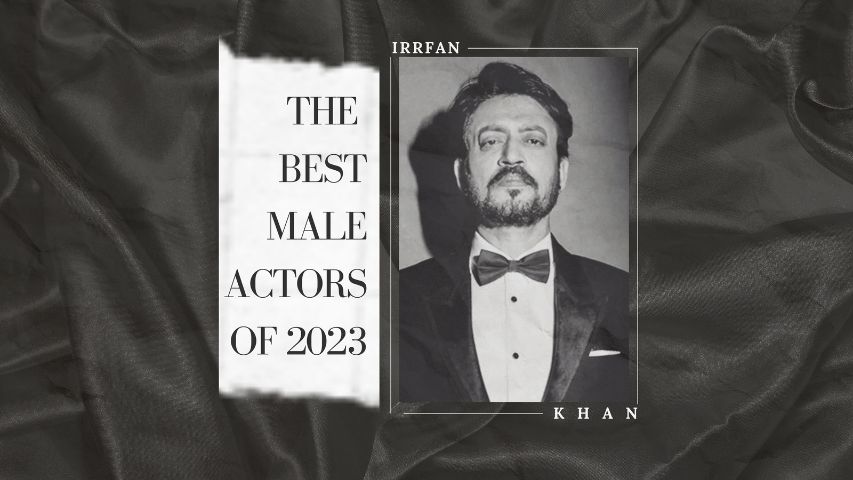
Irrfan Khan was a consummate actor known for his extraordinary talent. His performances spanned various genres. In The Lunchbox (2013) Irrfan’s portrayal of a widower was poignant, capturing the loneliness and yearning for companionship. The biographical drama Paan Singh Tomar (2012) featured Irrfan in the titular role of a soldier-turned-rebel athlete. His portrayal of Ashoke Ganguli, in The Namesake (2006), an Indian immigrant trying to navigate life in the United States, was deeply moving. Irrfan played the adult Pi in Ang Lee's visually stunning film Life of Pi (2012). His narration and portrayal of Pi's resilience and spiritual journey added a profound dimension to the story. In Maqbool (2003), an adaptation of Shakespeare's "Macbeth," Irrfan portrayed the character of a Mumbai underworld don.
His emotive depth and sheer talent, made him a revered figure in both Indian and international cinema. His untimely demise was a loss to the film industry, but his legacy continues to inspire and resonate with audiences worldwide.
FAROOQ SHEIKH
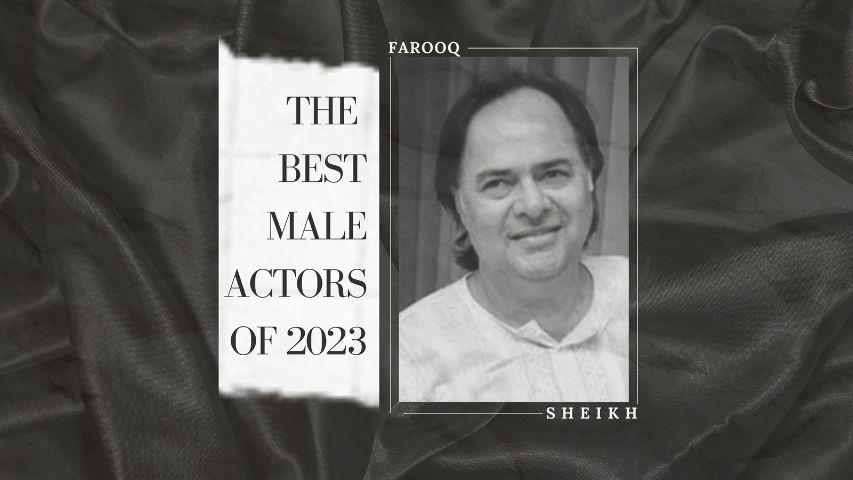
Farooq Sheikh was known for his natural performances, relatable characters, and subtle acting style. He contributed significantly to Indian cinema and left a lasting impression on audiences with his endearing portrayals.
His role as Siddharth in Chashme Buddoor (1981), the romantic comedy, showcased his effortless charm and boyish charisma. He portrayed the supportive and devoted Nawab Sultan in this classic film Umrao Jaan (1981) and his performance as a compassionate lover complemented the story of the courtesan Umrao Jaan, played by Rekha. In Sagar Sarhadi’s Bazaar (1982), Farooq was a man caught in the web of human trafficking. In a sensitive portrayal of relationships and aspirations, he played Avinash in Raman Kumar’s Saath Saath (1982) - a young man striving to pursue his dreams while navigating the complexities of love and career.
His contributions to parallel cinema in India and his ability to portray everyday characters with sincerity established him as a beloved figure in Indian cinema. Even though he is no longer with us, his memorable roles and his impact on Indian cinema continue to be cherished by audiences and the industry alike.
AMITABH BACHCHAN
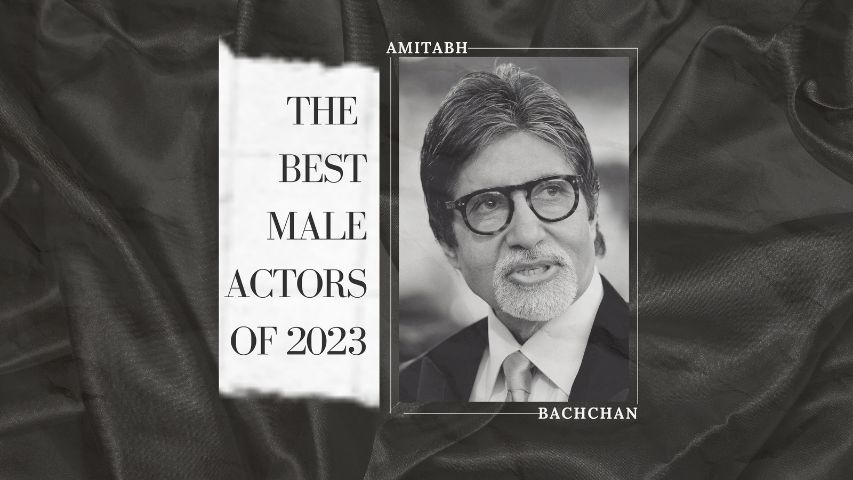
Amitabh Bachchan, Bachchan Saab as we know him, is known primarily for his mainstream Bollywood success and less for his significant contributions to art house cinema. Despite his stardom in commercial cinema, Bachchan Saab has chosen diverse and challenging roles that deviate from the typical hero-centric narratives. In films like Deewaar (1975) and Sholay (1975), he gained immense popularity. However, in art house films such as Black (2005) and Piku (2015), he showcased a different facet of his acting abilities. His performances in these films earned critical acclaim. Whether it's playing a grumpy father in Piku or portraying a teacher with a rare degenerative disease in Black, Bachchan Saab has displayed adaptability across various narratives. He has collaborated with auteur filmmakers like R. Balki and Shoojit Sircar and has received several National Film Awards and Filmfare Awards for his exceptional performances.
His ability to seamlessly transition between mainstream and art house cinema solidifies his stature as one of the finest actors in Indian cinema.
MALE ACTORS CARRYING THE LEGACY OF STALWARTS AHEAD
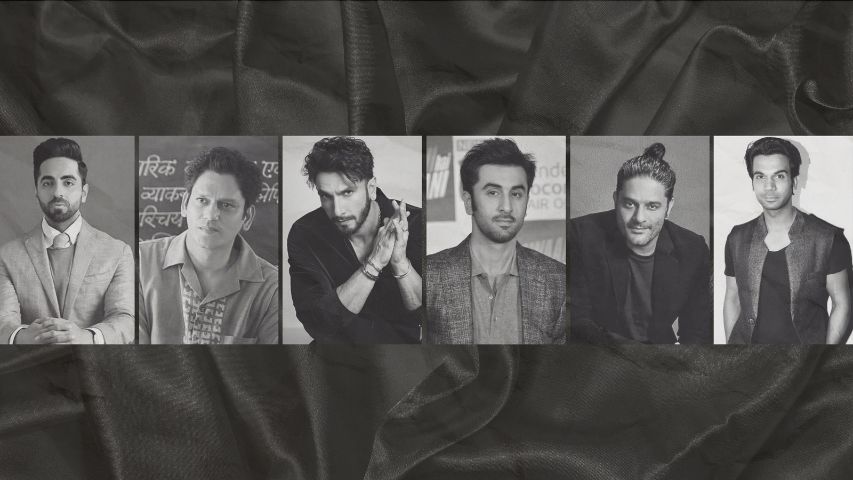
The young generation of Indian actors like Ayushmann Khurrana, Vijay Varma, Ranbir Kapoor, Ranveer Singh, Rajkummar Rao and Jaideep Ahlawat carry forward the legacy of stalwarts Amitabh Bachchan, Kamal Haasan, Farooq Sheikh, Naseeruddin Shah, and Irrfan Khan.
Ayushmann Khurrana, known for his unconventional filmography addressing societal issues, Ranbir Kapoor's diverse roles, Ranveer Singh's ability to transform for characters, Vijay Varma's nuanced performances, and Jaideep Ahlawat's impactful portrayals showcase their inclination toward challenging roles. Similar to the veterans, these actors are drawn towards content-driven cinema. They collaborate with diverse filmmakers and have garnered critical acclaim for their performances in films that transcend commercial boundaries.
These male actors, Ranbir Kapoor in Barfi (2012), Ranveer Singh and Vijay Verma in Zoya Akhtar’s Gully Boy (2019), Jaideep Ahlawat in Meghna Gulzar’s Raazi (2018), Rajkummar Rao in Amit V. Masurkar’s Newton (2017), and Ayushmann Khurrana in Sriram Raghavan’s Andhadhun (2018), are seen breaking away from convention quite often.
Their commitment indicates a promising future for Indian cinema's art house space, carrying forward the spirit and dedication of the legendary actors who paved the way before them.




-173X130.jpg)

-173X130.jpg)

-173X130.jpg)
-173X130.jpg)
-173X130.jpg)
-173X130.jpg)